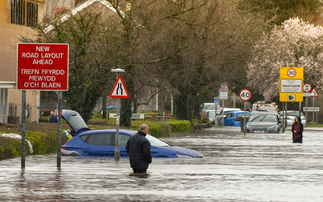Progress on the 17 Sustainable Development Goals is 'in danger' of going backwards, warns the UN
Progress towards the world's 2030 Sustainable Development Goals is in danger of going backwards unless there is a "fundamental and urgent change in the relationship between people and nature", the United Nations has warned.
A new report by the UN released on Wednesday offers a stark assessment of the state of the 17 SDGs, arguing that worsening inequalities and "potentially irreversible" damage to the environment is undermining economic growth. It warns "concerted action" is urgently required if the 17 Goals are to be met.
Set in 2015, the SDGs replaced the millennium development goals with a wide-ranging framework for driving sustainable development around the world. Split across 17 goals and 169 targets, they bring together inter-related economic, environmental, and social goals that detail how long term development progress can only be achieved if underlying environmental and social challenges such as climate change, biodiversity loss, and discrimination are tackled.
Compiled by a team of 15 UN-appointed experts, the latest progress report argues that boosting economic growth by increasing consumption is exhausting the planet's resources and creating toxic byproducts, which threaten to overwhelm natural environments and utlimately undermine economic progress. The report predicts material use globally is set to almost double between 2017 and 2060.
Continuing on the current path of extraction and consumption will increase greenhouse gas emissions and other toxic impacts, the report warns, arguing an urgent shift to a more sustainable model of economic growth is required.
The status quo must change, the report authors state, in order to avoid further loss in "social cohesion and sustainable economic growth", combat biodiversity losses, and save a "world close to tipping points with the global climate system".
They therefore call all sectors of the economy to come together through coordinated action to reform the current system so that it addresses inequalities and ensures economic growth is divorced from environmental degradation.
"The extensive transformation that is needed will not be easy, and the report suggests that a deep scientific understanding is needed to anticipate and mitigate the tensions and trade-offs inherent in widespread structural change," the authors state.
The report sets out 20 points of intervention to stem the tide of environmental destruction from overconsumption and worsening inequalities in order to accelerate progress towards the SDGs.
These include making basic services such as healthcare, education, water, and sanitation infrastructure, housing, and social protection universally available in order to eliminate poverty, as well as ending legal and social discrimination, and scaling up trade unions and human rights NGOs to help support the SDG agenda.
Moreover, structural change is required in global food and energy systems, which are currently driving mass malnourishment and depriving two billion people of food security, while also having severe environmental impacts, the report argues.
The report suggests that transitioning to renewable energy systems could avoid 3.8 million annual premature deaths worldwide by improving enegry access and allowing the estimated three billion people who rely on polluting waste, wood, or coal stoves for cooking to switch to cleaner alternatives.
With urban populations rapidly growing, action is also particularly needed in cities to ensure efficient infrastructure safeguards, rather than undermines, the natural environment and planetary resources, the report adds.
In his foreword to the report, UN Secretary General Antonio Guterres urged governments and businesses to take urgent action to address the 2030 SDG agenda.
"This report reminds us that the future is determined by what we do now and the window of opportunity is closing fast," he states. "I encourage all actors to translate the insights from this analysis into collective action."
The update comes ahead of a critical 18 months for the international community, as world leaders prepare to gather in New York later this month for a Climate Summit hosted by Guterres where he will call on them to come forward with more ambitious climate action plans. Officials are optimistic are host of new emissions pledges will be made, with reports suggesting China - the world's largest polluter - is working on a significant announcement.
The Summit kicks off an eventful year and a half, which will also see a major UN summit on biodiversity and the high profile COP26 Climate Summit in Glasgow next year where the Paris Agreement is expected to come into full effect.








